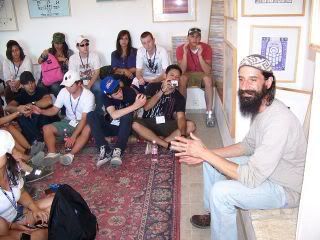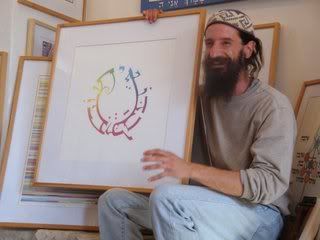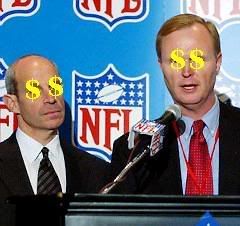"Welcome Home," To Israel
They were the first words we heard when we arrived at Ben Gurion Airport in Israel, 40 young Jewish adults, 18-26, here to enjoy a free trip courtesy of an organization called Birthright: "Welcome Home." Over the next ten days, we were to learn exactly what those two words meant.
In our orientation on the first day, Momo Lifshitz, the president of Oranim, the tour operator that organized our trip, told us that "everybody in Israel is Jewish." While not literally correct, (as one loudmo..er... opinionated girl in our group pointed out) his point was clear: In America, being Jewish can mean you're the one kid in class eating matzah while everyone else shares Easter candy. You're the guy who awkwardly has to correct someone when they wish you a Merry Christmas. In Israel, you're someplace where you don't have to explain why you've never eaten bacon or what a bar mitzvah is. Just like
everybody in America is Christian,
everybody in Israel is a Jew.
Was this what they meant by "Welcome Home"?
Yariv

Our guide, Yariv, introduced himself, and Israel. "Israel is a tiny country," he pointed out, cutting off segments on the map with a red pen that Israel had either given up or withdrawn from, plus uninhabitable desert, and places which will inevitably become part of a Palestinian state.
I knew that map well. In fact, I was pretty bored. I learned all this stuff... when were we going to do something?
Tsfat

Our first stop was the town of Tsfat, in northern Israel. One of the four holiest cities in Judaism, it is the home of Jewish Mysticism-- otherwise known as Kabbalah. Sadly, there were no Madonna sightings.
We did, however, meet Avraham, a guy from Detroit who, unlike other Detroit youth, got hooked on Kabbalah instead of drugs. No matter. Kabbalah seems to have had a similar effect on Avraham. He's grown out his hair, become an "artist" and has devoted his life to his addiction.
Thankfully, the side effects of being addicted to Kabbalah seem minimal. Avraham hasn't yet broken up A-Rod's marriage or starred in any movie as bad as "The Next Best Thing."
"Kabbalah believes that there is nothing but G-d," Avraham said. "Nothing in life is a coincidence. Everything we go through in our everyday lives is actually a spiritual transformation, helping us get closer to G-d and his infinite goodness. How awesome is that?"
So that time I got "pantsed" at high school football practice in front of the girl's soccer team was a spiritual transformation? Gee, thanks big guy!
Still, interesting, and much more complex a concept than I've described here. For instance, Kabbalah states that despite this idea of divine fate, there is free will: how we exercise it gets us closer (or further) from others and the spiritual workings of the world.
Something that interested me the most was what Avraham said about Kabbalah's beliefs about people's names. "Every person's name has a deep meaning about that person," he said. Names can say alot about someone's personality.
I was skeptical. First of all, I'm nothing like the two other Adams that were in my class in middle school. Secondly, a name is given to you just as you're getting the afterbirth washed off. Sure, we all know Picabo Street is named so because her parents were hippies and let her name herself at a young age, when "Peek-a-boo" was her favorite game. But when normal parents name you, they don't know how you'll turn out...
"But G-d does," Avraham would answer.

Ok, I'll give him that. Even more interesting was what he said about our names being a link to the past. Every Jewish child, in addition to an English name, is given a Hebrew name. In some cases, they are the same. In my case, not. Much like the Christian tradition of naming children after their father, Hebrew names tend to be taken from either a parent or grandparent. My Hebrew name is Y'hezkel. It was my grandfather's. Avraham pointed out that it was most likely my grandfather's grandfather's Hebrew name as well, since they were likely strong followers of Jewish tradition.
If a name says a lot about your personality, and I have in my possession a name that an ancient ancestor of mine had, then through my Hebrew name, I can connect with my ancestors. I can find out the meaning of my Hebrew name, and get an idea of what my great-great-great-great grandfather was like. It's an interesting concept. And even if its complete hooey (for all I know, my great-grandparents picked my grandfather's Hebrew name at random), it did make me wonder about who my ancestors were. It's something I never really thought about.
At some point in the distant, distant past, my ancestors were here, in Israel. Probably herding goats. And a young, strapping, Y'Hezkel was writing his blog entry on some parchment, hoping that one day, someone would invent the internet and he'd finally be able to share his thoughts on the Philistines with the world. In the centuries to come, his children and children's children would be flung to the far parts of the world. Far away from the land that would one day be known again as Israel.
Maybe that was what they meant by "Welcome Home." Y'Hezkel was back! (in DNA, at least)
As we left Avraham's, Yariv pointed out a building riddled with bullet holes. The steep narrow staircase we stood on was the original border between the Arab side of the town and the Jewish side. The Jews living in Tsfat were like Avraham... except even more religious. There were 1,700 of them. There were 12,000 Arabs.
According to the UN partition plan (the one that Yariv drew for us on the map earlier), Tsfat was to become part of the Jewish state. But when the British pulled out, the Arabs took over control of the city. They cut off the Jewish Quarter and tried to force its residents out with mortar attacks and gunshots, which they fired from their positions at the highest points in town.
The religious Jews couldn't defend themselves. Their only defense were 200 Haganah fighters and 50 fighters from the Irgun (both of which had resisted British rule).
Then Shabbat came.
On Friday night, when every good Jew should have been at home observing the Sabbath rest, 35 additional soldiers snuck into the city. The next day, the rabbi in the city had a decision. Tell his followers to keep the Sabbath, or to help the soldiers fortify the city.
He ordered his congregation to break the Sabbath, cooking for the soldiers and helping them build up the defenses. Despite being completely outmanned and outgunned, they held off the attacking Arab army. Yariv told us that the Israelis only had piece of heavy artillery, the Davidka, and it made more noise than actual damage. But the noise frightened the Arab soldiers, and those in town. Myths were spread around that the Israelis had some serious firepower. So the Arabs fled.
Why flee, when they had superior numbers? Yariv put it like this: "They had someplace else to go," he said. "We didn't. So when things got tough, they left. We stayed. We had no choice."
"Welcome Home." For many Jews in 1948, Israel was the only one they had.
It was one thing to see the lines on the map, know the history. It was another to see those bullet holes, to see how small a space divided the Jews from the Arabs, to see just what a huge advantage the Arabs had, firing from the top of the mountain, determined to wipe their enemy out. A victory for Israel truly was a miracle.
That night our group slept at a Kibbutz, a communal village in which the residents share all and work together in a common enterprise. Israel was built on the strength of these kibbutzes, which gave early settlers of the land security in an insecure part of the world.
In 1948, they must have had better food. Choking down a soggy spring roll and avoiding my hair-strewn salad, I wondered how Kibbutz-living Jews could have fought for independence back then on such gross stuff.
Long after most of the group had gone to sleep, a girl from NY, a guy from Cali and me stayed up drinking and playing cards with five young Israeli guys from the Kibbutz [all of us over 21, of course].
[The rest of this entry was deemed un-kosher by the Birthright authorities. So I removed it. Let's just say five Israeli guys went home that night disappointed.]
Stay tuned, if you're still out there. More Israel comin up.




